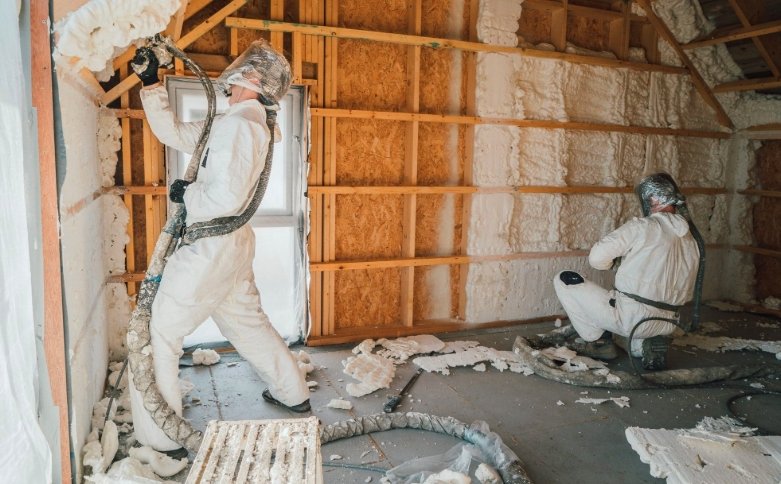As Scotland pushes toward net zero, fraudsters are cashing in on eco schemes—leaving ordinary people paying the price, quite literally.
A costly scam hiding behind green promises
It sounded like a good idea. Help the planet, save on energy bills, and maybe even qualify for a grant. But for homeowners across Scotland, the promise of greener homes has quickly turned into a financial and emotional nightmare.
Consumer Scotland has issued a sharp warning to households as scams involving green energy upgrades—particularly spray foam insulation—are on the rise. In 2023 alone, reported cases jumped by 42%. And with over 2 million households expected to upgrade to low or zero-emissions heating by 2045, the situation is teetering on the edge of a crisis.
It’s not just numbers on a page. Behind each complaint is a real person—many elderly or vulnerable—who trusted someone at their doorstep, only to be left with damp lofts, ruined insulation, and empty wallets.

“They came to my door. I let them in.”
David Adams, 87, still feels the sting. A retired widower in Glasgow, he paid £5,300 to Smarter Insulation Ltd after being told he urgently needed spray foam to deal with loft moisture. A shiny brochure. A confident sales pitch. A quick survey.
He admits, “I committed the cardinal sin. Someone chapped my door and I let them in.”
Just two weeks later, another company—this one warning about the very insulation he’d just installed—advised him to get it removed. It would, they claimed, cause damp, make his roof uninsurable, and lower the value of his home. He paid another £2,750 to take it out.
Eight thousand pounds gone. Just like that.
One sentence here: He never saw a penny returned.
And he’s not alone.
Repeat offenders and a life-cycle scam
Consumer Scotland’s head of investigations, Craig McClue, says what they’re seeing isn’t just dodgy sales—it’s something far more organised.
In some cases, the same traders return under new business names to remove the very insulation they previously installed. It’s a scam with a beginning, middle, and repeatable end.
-
Common tactics used by rogue insulation traders:
-
Offer free loft surveys, often unsolicited
-
Insist on immediate decisions
-
Claim urgent risks like damp or energy loss
-
Provide misleading claims of mortgage impacts
-
Return under new company names for removal work
-
Spray foam insulation, while legal and effective in certain contexts, has become a hotbed for abuse due to consumer confusion, lack of enforcement, and unclear standards.
Trading Standards has confirmed ongoing investigations into Smarter Insulation, FastFoam, and RAS (Roofing Advisory Service)—three companies intertwined in customer complaints, all with links to one another.
Cracks in consumer confidence
For those working in consumer protection, the bigger concern isn’t just about the money lost—it’s about the trust that’s disappearing.
Fiona Richardson from Trading Standards Scotland put it plainly: “Miss-selling is damaging trust in the whole green home heating sector.”
And trust is vital. Scotland’s 2045 net zero target relies heavily on individuals converting to cleaner home heating and insulation. If the public stops engaging due to fear of scams, the timeline gets shaky.
Sam Ghibaldan, chief executive of Consumer Scotland, says the industry needs tighter rules: mandatory trader accreditation, more power for enforcement agencies, and a clearer, faster complaints system. Without it, households are left exposed.
Two paragraphs now:
-
The Scottish Government says it’s working on this, in collaboration with the UK Government and Ofgem.
-
New consumer standards for heat networks—covering reliability, fair pricing, and support—will kick in by January 2026.
But for some, that’s too far away.
What customers are paying—and losing
Many victims paid thousands upfront, often under pressure. And when something goes wrong, it’s almost impossible to recover the money.
Here’s a comparison of typical scam-related costs:
| Service Stage | Average Cost (GBP) | Notes |
|---|---|---|
| Spray Foam Installation | £4,000–£6,000 | Often paid upfront, no refund terms |
| Removal of Faulty Insulation | £2,500–£3,500 | Typically done within weeks |
| Total Loss per Incident | £6,500–£9,500 | In some cases even higher |
One-sentence paragraph: It’s not just the money—it’s the stress, the mould, the damage, and the paperwork that comes after.
Even the banks and insurers are wary. Homes with poorly-installed spray foam may be harder to sell or refinance, meaning victims aren’t just losing cash—they’re losing peace of mind.
Companies pointing fingers as they fold
Smarter Insulation and FastFoam, now reportedly shut down, have blamed former staff who joined RAS. According to them, rogue individuals have misused company data to re-target customers with fresh scams.
But BBC Scotland couldn’t reach RAS for comment. And consumers are left caught in the crossfire.
David Adams’ experience sounds like something from a thriller novel: a company turns up, sells a fix, disappears, another one swoops in, removes the fix, blames the last group, and charges more.
He said, “You just think, ‘I’ve been a sucker’… I should’ve known better.”
But should he have? Or should protections have stopped this from happening in the first place?
The road ahead: warnings, reforms, and watchlists
The Consumer Scotland report makes clear demands. It wants mandatory licensing, better data sharing, and more resources for local authorities to chase rogue traders.
It also wants householders to be able to spot bad actors more easily and to have somewhere to turn when things go wrong.
McClue stresses the urgency. “We’re talking about millions of people entering this market over the next 20 years. If we don’t fix the problem now, it’s going to explode.”
One-line paragraph again: And explode it just might.
Both Scottish and UK governments have welcomed the recommendations. But welcoming isn’t the same as acting.
Until then, homeowners are being asked to do the one thing they shouldn’t have to do in the middle of an energy transition: stay on high alert.


















